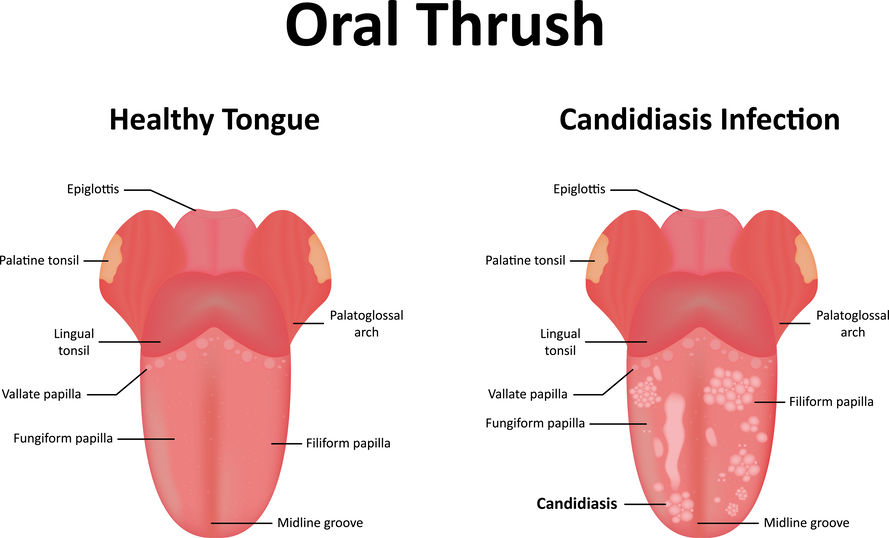What is oral thrush and where does it come from?
Thrush is another term for an infection caused by a type of yeast in the Candida family of fungus. You may also hear it called Candidiasis, which is the medical term for thrush. Candida is part of your body’s normal microbiome, which is made up of bacteria and other organisms that lives throughout your body without causing any issues most of the time. Candida can be found in your mouth, throughout your digestive system, and inside the vagina. When the balance of your body’s normal microbes changes, it can allow certain ones to grow in number more than they normally can. Thrush is the overgrowth of the Candida yeast and when we classify it as Oral Thrush, that tells you where the overgrowth is occurring, in your mouth.
What are the symptoms of oral thrush?
Oral thrush can affect any area of your mouth including your tongue, roof of your mouth and tonsils (if you still have them). It can also spread further down your throat into your esophagus.
Symptoms can include white patches on the inside of the mouth, redness, soreness, “cotton-mouth”, pain while eating, pain or difficulty swallowing, loss of taste, and redness or cracking on the outside corners of your mouth.
A healthcare provider can help diagnose oral thrush if you have any of the above symptoms. Luckily, the diagnosis for oral thrush is as easy as looking inside your mouth in most cases. On occasion, your doctor may send a sample to be examined further or perform an endoscopy.
Who can get oral thrush?
In most healthy adults, oral thrush is uncommon and you may never experience it in your lifetime. However, certain health conditions can increase your risk, especially those conditions that weaken your immune system. People who have diabetes, cancer, or HIV/AIDS are at increased risk. In these patients, their immune systems may not be able to fight infections as well as a healthy individual.
Certain medications, like antibiotics, inhaled corticosteroids (used in asthma) or other medications that can cause dry mouth as a side effect can also increase the risk of developing oral thrush. Your doctor or pharmacist will help you identify these medications and give you a few ways to prevent oral thrush if needed.
A few other risk factors include wearing dentures or smoking as these can disrupt the normal microbes that live in your mouth and encourage the Candida to grow. Young babies, particularly those less than 1 month old, can also commonly develop oral thrush.
How can I prevent oral thrush?
Since it is uncommon in healthy adults, preventing yourself from getting oral thrush is very straightforward. The most important thing you can do is maintain good oral health. This means brushing your teeth twice daily, floss, and schedule your yearly dental visits among other things.
Here are some other ways you can reduce your risk of oral thrush:
- Follow up regularly with your healthcare provider to manage your health conditions.
- If you have an inhaled corticosteroid, like fluticasone (Flovent HFA), remember to rinse out your mouth with water after each use.
- Drink lots of water if you are prescribed a medication that causes dry mouth.
- Maintain denture cleanliness
- Avoid smoking cigarettes
For babies and children, here’s a few ways you can help them with their oral health.
What can I take over-the-counter to treat it?
If you suspect you or your family member has developed oral thrush the best thing you can do is follow up with your healthcare provider. Treatment options include prescription antifungal medications applied topically or taken as an oral tablet for 7 to 14 days. These antifungals include nystatin, miconazole, clotrimazole and fluconazole and are generally very safe to use.
There are a few over the counter remedies to help relieve some of the symptoms of the infection. They won’t cure the infection, but they can be used along with prescription medications to ensure relief of symptoms.
Probiotics – Oral probiotics can help promote the balance of good bacteria in your body and have beneficial effects on oral thrush. You can get probiotics as a supplement or in certain unsweetened yogurts (like Greek yogurt).
Warm saltwater rinse – Rinsing your mouth with saltwater can help relieve pain and sores associated with oral thrush. Other options can include a mixture of water with baking soda, lemon juice, or apple cider vinegar.
Be wary of over-the-counter products or ones you see marked online stating they cure oral thrush. If you use any natural product and the symptoms don’t resolve in 1-2 days, please follow up with your doctor.
When should I talk to my doctor?
It is always best to follow-up with your healthcare provider, even if your symptoms are mild. If you have a health condition that lowers your immune function, it is even more important to talk with your doctor. Some over-the-counter products aren’t always safe to use with infants and children, so it is recommended to talk with your pediatrician before using any products.












